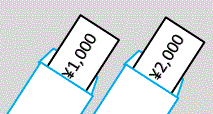Return to the list of my pages written in English about the two envelopes problem
Return to the list of my pages written in English about the two envelopes problem
2018/06/24 9:04:45
First edition 2015/03/22
 Interesting web pages about the Two Envelopes Problem
Interesting web pages about the Two Envelopes Problem
Caution
I who am a Japanese wrote this page in English, but I am not so good at English.
I who am a Japanese wrote this page in English, but I am not so good at English.
Explanations easy to understand
|
|
|
|---|---|
| 1 |
A comment from jeffjo56 to the article "THE TWO ENVELOPES PROBLEM" on the site "puzzlewocky". [COMMENT] Using two kinds of pairs jeffjo56 explained that the probability is not necessarily 1/2. In this explanation number of pairs was increased step by step as follows. one ($5,$10) Such an explanation is very easy to understand.
one ($5,$10) and one ($10,$20) nine ($5,$10) and one ($10,$20) |
| 2 |
Explanation by Daryl Weir on February 21, 2015 at 4:07 AM in a page "Sperling Grove: On the Envelope Problem" in a blog "Sperling Grove" by Matt Sperling. [COMMENT] Weir explained that the following proposition is wrong. "the other envelope contains $50 with .5 probability, and $200 with .5 probability" His explanation is easy to understand. |
| 3 |
Page "BBC - h2g2 - The Two-envelope Paradox" by BBC [COMMENT] It explained in detail that the cause of the paradox is a fallacy of probability. |
| 4 |
The section "Analyse mit bedingten Wahrscheinlichkeiten" of the German language Wikipedia article "Umtauschparadoxon" (am 16. Juli 2015 um 23:12) [COMMENT] In the sub section "Diskrete Verteilungen", it is explained how to calculate the conditional probability of a discrete probability distribution. It is easy to understand because Baye's theorem is hidden. In the sub section "Stetige Verteilungen", it is explained how to calculate the conditional probability of a continuous probability distribution. It is comparatively easy to understand because it uses the concept of cumulative distribution function. |
| 5 |
A blog page posted by NaClhv on August, 2015. Page title is "NaClhv: The two envelopes problem and its solution". [COMMENT] NaClhv used a simple phrase "stretched and compressed" to analyze the relationship of the distribution of the lesser amounts and the distribution of the greater amounts. And NaClhv made very simple proof of the equivalence of the two envelopes. |
| 6 |
A YouTube video "Statistics: Two Envelopes Problem" posted by a person whose name is "The Geekosphere". [COMMENT] This video used a technique to animate mathematical equation, and this video is very easy to understand. |
| 7 |
An answer for a question "If you have two envelopes, and ..." at a question site "Mathematics Stack Exchange" (Asked by terrace on Oct 8, 2014. Answered by robjohn♦ on Oct 9, 2014.) [COMMENT] In this answer it is explained in an easy-to-understand manner that mean values of conditional expectations of the amounts of money in each envelope are same. Explanation of the randomized switching is somewhat difficult for me. |
Short explanations
|
|
|
|---|---|
| 1 |
A comment from Alex Zeffertt to the article "Maths in a minute: The two envelopes problem" of the internet magazine "Plus". [COMMENT] Only two sentenses were written. "p is not 1/2. It's a function of x, which you don't know." |
Interesting variations of the problem
|
|
|
|---|---|
| 1 |
An interesting variation of the two envelopes problem is presented in a page "wu :: forums - Two envelopes problem - a variation" by William Wu. This page is under the site "Open Computing Facility at University of California, Berkeley". [COMMENT] Knowledge of distribution of amount of money is not needed to solve this variation. It is a puzzle that is to be solved rather than a paradox that is to be resolved. |
Interesting debate
|
|
|
|---|---|
| 1 |
A page titled "Sperling Grove: On the Envelope Problem" in a Blog "Sperling Grove" by Matt Sperling. [COMMENT] Various opinions were presented. |
Comics, documentary, and so on
|
|
|
|---|---|
| 1 |
A comic by StrixVanAllen of a page "Two envelopes problem by StrixVanAllen on deviantART" in a site "deviantART" [COMMENT] Last phrase "Who is the loser?" gives fun. |
| 2 |
A page "Numberplay Your Money or Your Logic - NYTimes.com" in a site "The New York Times" [COMMENT] From the talk by the professor I can infer that the another envelope contained $10. |
Return to the list of my pages written in English about the two envelopes problem